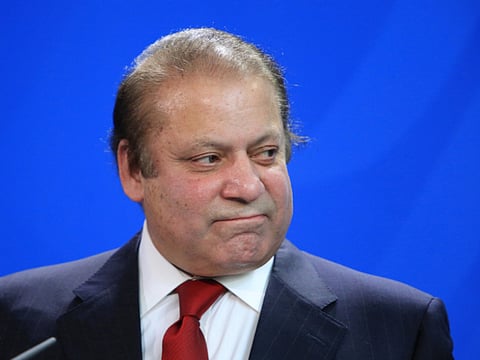What is next for Pakistan?
With prime minister Sharif now out of office, it is vital for key institutions of the state to pursue other individuals suspected of corruption

Friday’s dismissal of Pakistan’s prime minister Nawaz Sharif, following more than a year-long court battle over offshore wealth owned by his three children, must count as a historic moment in the South Asian country’s 70-year history.
The Pakistan Supreme Court’s order, after the long trial, prompted by the discovery of the unaccounted wealth in the ‘Panama leaks’ scandal, has squarely placed Pakistan on the crossroads. While there is indeed an opportunity to begin reforming the country as never before, the pitfalls are equally challenging.
Along the road, some leaders of Sharif’s Pakistan Muslim League-Nawaz (PML-N) have publicly made veiled references to the powerful army instigating Sharif’s dismissal, with repeated claims of a “conspiracy” against Pakistan’s democracy. And yet, the fact that the ‘Panama leaks’ were triggered by events far away from Pakistan and the subsequent investigations carried out under the supervision of the Supreme Court negate all such conspiracy theories.
But now that Pakistan has made history with Friday’s decision, Sharif’s ouster can only be seen as the first step in a long journey to reform the country. The wealth of Sharif’s three children, including the luxurious and exorbitantly expensive flats in central London, have brought out one of the most uncomfortable truths for the country’s wealthy elites. Pakistan’s elites, who dominate its politics and the economy, have long been accustomed to flagrantly violating the law. As ordinary Pakistanis have been repeatedly forced to tighten their belts, including the tough conditions attached to a succession of loan programmes from the International Monetary Fund (IMF), the elite class has remained immune to any pressure.
Consequently, Pakistan has suffered the brunt of the ways in which its ruling elites have created safe havens for themselves at the cost of the public. An oft-repeated and a very powerful reality of less than one per cent of Pakistan’s population paying income tax, highlights an even more blatant reality. With the elite determined to remain above the law, Pakistan has become a tragically lawless country. The ‘Panama leaks’ trial, which focused on Sharif, his children and close family associates, noteably Finance Minister Ishaq Dar, vividly exposed a terrible disdain for rule of law among the high and the mighty. Consequently, it is hardly surprising that many across the board in Pakistan have equally considered it their right to flout the law.
In the short term, Pakistanis indeed have ample reason to celebrate Friday’s verdict as an example of justice served in relation to the country’s highest elected representative. But in the long run, the verdict will eventually become meaningless unless it leads to promoting a powerful change in at least three equally important ways.
First, with Sharif now out of office, it is vital for key institutions of the Pakistani state to pursue other individuals suspected of blatant corruption. Rather than treating the Sharif case as a lone matter of a witch-hunt, its essential that a wider focus is demonstrated.
As Pakistan goes forward, it is equally essential to begin reforming three important institutions whose roles will be critical to battling and curbing corruption. These are the Federal Bureau of Revenue (FBR), the main federal tax collection agency, the State Bank of Pakistan (SBP), the country’s central bank, and the Securities and Exchange Commission of Pakistan (SECP) — the latter being the main regulator of companies in the country. Together, these three institutions share the tools to curb major lawlessness leading to white collar crimes.
Second, there is no quick-fix to tackling Pakistan’s long-term malaise, which has now widened the incidence of corruption and created a thriving black economy. However, a quick follow-up on Friday’s verdict creates the opportunity for Pakistan to embark on a new and unprecedented road to reforming the country. With Sharif out of the political picture for now, Pakistan’s next prime minister will have to move quickly to restore the public’s faith in the ruling structure. This will require more than mere lip service. A series of actions will be necessary to demonstrate that the top tiers of the Pakistani government have zero tolerance for breaking the law.
Finally, Sharif’s former government indeed became notorious for a blatant refusal to acknowledge a range of issues — from energy shortages crippling the country to the true state of national debt. Dar, who was also dismissed on Friday, following questions over his involvement in money laundering, repeatedly went out of his way to present a promising picture of the country’s economy. One question that has been repeatedly raised, though with few convincing answers, is how does the government plan to service a rapidly ballooning national debt? With little credible performance by way of reforming Pakistan’s tax-collection network, the Sharif government only became notorious for being spendthrift on fancy projects — all funded by fresh loans.
Following Friday’s verdict, Imran Khan, the former cricket captain-turned-politician, who had led the charge against Sharif, publicly lamented over a well-known personal account. In the weeks prior to the verdict, key leaders of the PML-N had questioned the financial accounts of the Lahore-based Shaukat Khanum Cancer Hospital, built by Imran in memory of his mother. The hospital was built primarily through donations. Clearly, the PML-N’s allegations left many Pakistanis unconvinced. But more importantly, the facility, which is Pakistan’s first-ever hospital for cancer treatment, has no photo of Imran anywhere in its premises. bearing testimony to the distance that Imran maintains from the hospital. This only reveals Imran’s dedication in creating what has indeed become a proud landmark for the country. The effort put in creating the Shaukat Khanum Cancer Hospital also shows the way towards a more promising future for Pakistan.
Farhan Bokhari is a Pakistan-based commentator who writes on political and economic matters.


